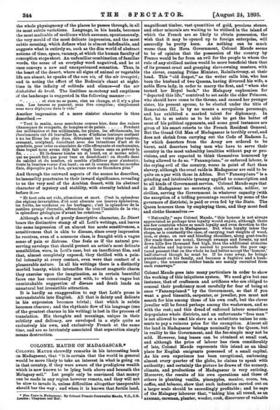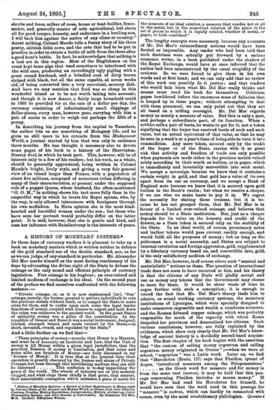COLONEL MAUDE ON MADAGASCAR.*
COLONEL MAUDE shrewdly remarks in his interesting book on Madagascar, that it is certain that the world in general would be more likely to take an interest in what is going on in that country, if they were aware of the prodigious wealth which is now known to be lying both above and beneath the Malagasy soil." Let people only be convinced that money can be made in any region however remote, and they will not be slow to invade it, unless difficulties altogether insuperable should bar the way ; and when it is known that fertile land, • Fine Years in Madagascar. By Colouel Francis Cornwallis Maude, V.C., C.B. London: Chapman and
magnificent timber, vast quantities of gold, precious stones, and other minerals are waiting to be utilised in the island of which the French are so likely to obtain possession, the wish that it may be opened up to foreign enterprise, will assuredly be pretty keen. As nothing can be much worse than the Hova Government, Colonel Maude seems to be of opinion that the possession of the country by France would be far from an evil for the people to whom the rule of any civilised nation would be more beneficial than that of its present cruel and grasping slave-owning masters, with the clever, cunning Prime Minister, Rainilarivony, at their
head. This "old despot," as the writer calls him, who has been the husband of two Queens, having divorced his wife, a
noble Hova lady, in order to marry the first, and "when she turned her Royal back," the Malagasy euphemism for "departed this life," contrived to set aside the elder Princess, who should have come to the throne, and caused her younger sister, his present spouse, to be elected under the title of Ranavalona III., is by no means a scrupulous personage, and has exhibited a marked talent for diplomacy. In fact, he is so astute as to be able to get the better of most of his political opponents, and some good instances are given of his smart retorts to the French Resident General. But the Grand Old Man of Madagascar is terribly cruel, and does not shrink from carrying out the Code of Radama I., by which deserters from the Army are ordered to be burnt, said deserters being men who have to serve their country in the most unhealthy localities without pay or pro- visions, and are expected to think themselves honoured by being allowed to do so. "FattampOana," or enforced labour, is the crying evil of the country, worse in point of fact than slavery, although the cruel raids in Madagascar are said to be quite on a par with those in Africa. But" Fanamp6ana" is a grinding and intolerable tyranny applied to conscription and to all kinds of Government service. 'Colonel Maude says that in all Madagascar no secretary, clerk, artisan, soldier, or civilian, serving the Government in whatever capacity (with the exception of a trifling percentage received by some of the governors of districts), is paid or even fed by the State. The Queen honours them by employing them, and they must feed and clothe themselves
Naturally," says Colonel Maude, "this honour is not always appreciated as perhaps true loyalty would enjoin, although there are few countries where so much loyalty and even devotion to the Sovereign exist as in Madagascar. But when loyalty takes the shape, as is constantly the case, of carrying vast weights of wood, iron, or stone, on raw and bleeding shoulders, along goat-tracks (for roads there are none), through swamps and forests, up and down hills five thousand feet high, then the additional stimulus of shackles and leg-irons is needed to persuade the poor cap- tured peasant that on the whole he had better accept the 'honour,' half-starved though he must be. If he runs away, he brings punishment on his family, and becomes a fugitive and a bush- ranger ; the numerous robber bands are mainly recruited from such runaways."
Colonel Maude goes into many particulars in order to show the working of this iniquitous system. We need give but one instance, that of craftsmen and artificers who are obliged to conceal their proficiency most carefully for fear of being at once "Fanamp6aned " by the Government, so that if you want a good tinsmith, carpenter, or jeweller, you must not search for him among those of his own craft, but the clever jeweller will be found perhaps among the washermen, and so with the rest ; and this dread of enforced labour sometimes depopulates whole districts, and an unfortunate "free man" is not allowed to send his slave as a substitute unless he con- sents to pay a ruinous price for the exemption. Almost all the land in Madagascar belongs nominally to the Queen, but in reality to the Government, and the fee-simple may not be sold. However, long leases can be obtained at small cost, and although the price of labour has risen considerably of late, Colonel Mande represents this island as an ideal place for English emigrants possessed of a small capital. As his own experience has been exceptional, embracing almost every quarter of the globe, he claims to speak with authority; and certainly the picture he draws of the scenery, climate, and productions of Madagascar is very enticing. Moreover, the results of his own operations and those of others in planting vanilla, pineapples, manioc, cocoa, tea, coffee, and tobacco, show that such industries carried out on a larger scale should be exceedingly profitable; and he says of the Malagasy labourer that, "taking him all round, as an axeman, oarsman, planter, weeder, cook, discoverer of valuable shrubs and trees, milker of cows, house or boat builder, fence- maker, and generally master of arts agricultural, but above all for good temper, honesty, and endurance in a broiling sun, I will back him against the native of any clime or country." Anent milking, Colonel Maude tells a funny story of his three pretty, skittish little cows, and the arts that had to be pat in practice in order to obtain a bottle of milk from the three after a good hour's battle. In fact, he acknowledges that milking is a lost art in this region. Most of the Englishmen on the coast kept tame pigs that used sometimes to interbreed with the wild ones, producing an exceedingly ugly pigling with a great round forehead, and a brindled coat of dirty brown striped with black, but all the same capable, at seven weeks old, of being converted into a very succulent, savoury dish. And here we may mention that food was so cheap in this wonderful island as to be not worth taking into account; and though it is now dearer, a fairly large household could in 1888 be provided for at the rate of a dollar per day, the currency consisting of infinitesimally small clippings of dollar-pieces, every man, however poor, carrying with him a pair of scales in order to weigh out perhaps the fifth of a penny.
In describing his journey from the capital to Tamatave, the author lets us see something of Malagasy life, and he gives us still more in his extracts from the Madagascar World, a journal started by him that was only in existence three months. He has thought it necessary also to devote some pages of his book to a history of the Shervinton- Daeray duel, in which he took part. This, however, will be of interest only to a few of his readers ; bat his work, as a whole, should be generally appreciated, being written in Colonel Mande's bright, lively style, and giving a very fair general view of an island larger than France, with a population of about five millions, composed of numerous tribes differing in many of their characteristics, at present under the supposed rule of a puppet Queen, whose husband, the often-mentioned "G. 0. M.," in nothing shows his tact more fully than in the respectful way in which he treats his Royal spouse, who, by the way, is only allowed intercourse with foreigners through his own mediation. In nova opinion she is the most kind- hearted and beautiful woman under the sun ; but those who have seen her portrait would probably differ on the latter point. It is said, however, that she is gentle and kind, and uses her influence with Rainilarivony in the interests of peace.



































 Previous page
Previous page